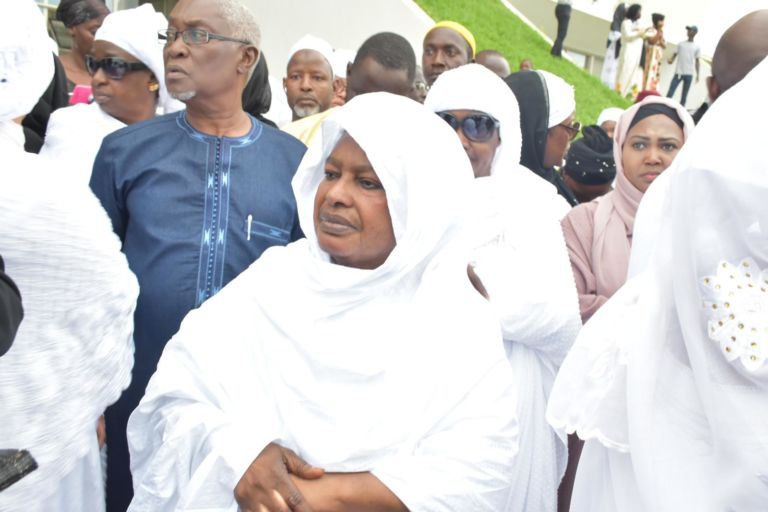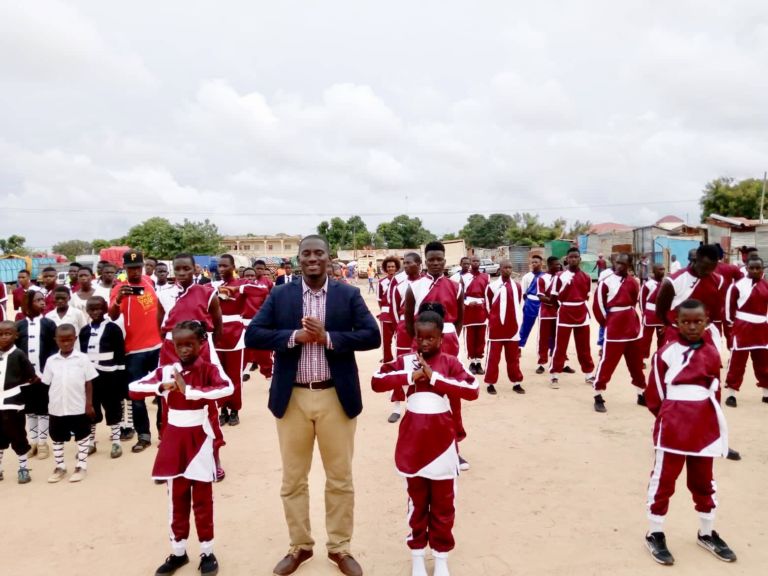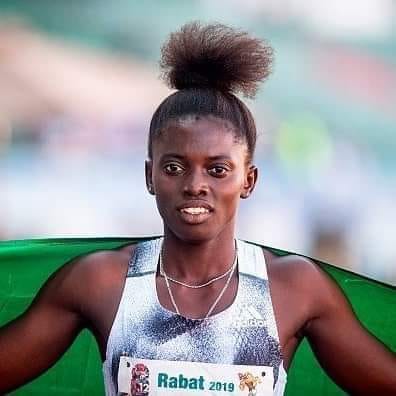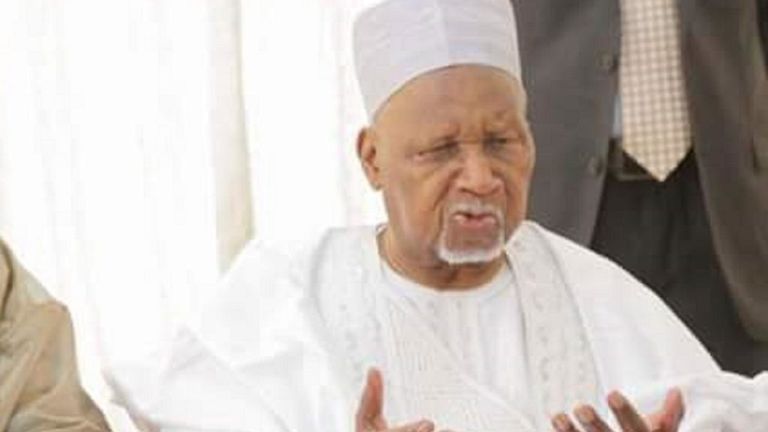Greetings,
As The Gambia is mourning the demise of Sir Dawda Kairaba Jawara, the country’s first president, I invite you to read the marathon interview the great Baaba Sillah had with Kairaba some years ago in the United Kingdom, precisely in Sussex. This was a couple of days before he moved from his house with plans to return to Banjul. Unfortunately, they could not meet again as Sir Dawada was always busy with visitors or attending to one ceremony or another. In the end, Baaba gave up trying for another conversation. Not having met him in person, he could not help noticing for the first time that, he was sanguine and composed. He was an excellent listener and his responses to questions were always measured. Like him or loathe him, for Baaba “Jawara epitomised tolerance and respect for the other”. Baaba’s foresight in seizing the moment and the quality of the discussion with Sir Dawda will undoubtedly help many young Gambians to know their history. We came a long way….The socio-political trajectory of The Gambia in the early 60s is now presented before you to assess Kairaba’s rule and legacy and draw lessons from them, for the future of our country. May his soul rest in perfect peace. Adieu Kairaba !
Pierre Gomez, PhD
Professor of Comparative Literature
Dean, School of Arts and Sciences
The University of The Gambia
Brikama Campus, P.O. BOX: 3530
The Gambia, West Africa
“Baaba: What would you say were your major influences when you grew up in The Gambia?
Sir Dawda: I was in Banjul in the 40’s. I was born in Barajali in the Maccarthy Island Division and I came over to Banjul and stayed with the late Ibraima Jallow. He adopted me while he was a trader in Waali Kunda. Both Jallow and my father were friends and they were both traders working for different Firms. At the end of one trade season, he asked my father if he could take me to Banjul so that I could go to school. At the time, there were no Schools in that part of The Gambia. My father agreed but my mother tearfully agreed so that I could leave and go to Banjul. I was about eight, which would be around, Well! I was born in 1924 1932 or thereabouts. I would therefore say that my main childhood influences were my guardian Mr jallow and his family, in Banjul and of course some others in the neighbourhood. When I got to 37 Wellington Street, which was my address in Banjul, I went to Daara there. The teacher at the daara was then Serinj Mataar Jonn. Interestingly enough, when I got there and joined the Daara, Serinj Mataar Jonn had already aged. He was ill and bed-ridden. He had had a stroke. As a new arrival, I got on extremely well with him and in the end; I took total charge of him. I was probably the one who could decipher his sounds, his signs and monosyllabic language now looking back, that experience left a big impact on me for the rest of my life. I also discovered my tenderness for the sick.
Our maggi-Daara was Momadu Gey and I carried on with the training at the Daara. I went to elementary School at Mohammedan School. The headmaster was J D O Wilson. Some of the staff members were brought over from Sierra Leone to establish and run the Mohammedan school. The Muslim community of Banjul with the help of the Colonial Administration established this School. So the Daara, of Serinj Mataar Jonn, Mohammedan school, and the Jallow Family could be said to have been my big influences from when I arrived in Banjul.
Baaba: Presumably the Mohammedan School was not just and Elementary School?
Sir Dawda: Yes it was just an Elementary School! This is to say that from sub-standard to Standard seven (7)! However, when I finished that Elementary school, I had done so well as to win the ‘Photo’ at standard seven.
Baaba: was this some kind of award for achievement?
Sir Dawda: Well! In those days, at the end of every year, there was an examination for all the pupils of standard 7 from all the Schools in the Colony, Banjul and her surroundings. The pupil that did the best at that examination, in that year was awarded the ‘Photo’.
Baaba: Whose Photo might this have been?
Sir Dawda: the Photo actually was the photograph presented by Bathurst of the Gambia and Bathurst of Australia. In other words, the winner was given a scholarship to secondary School. The choices of Secondary school were to the Saint Augustine’s Secondary, the Methodist Girls High School and the Methodist Boys high school I chose the latter. Well of course one could have chosen, Armitage School possibly, in Georgetown but these were the choices within the Colony.
Baaba: Let me take you back a bit Sir Dawda, can I take it literally that the ‘Photo’ to mean a photograph with somebody’s image or was it a trophy of some sort like a shield or a cup?
Sir Dawda: Well it was a photograph and I reckon that it could have been the photograph of Earl Bathurst who was a Colonial Secretary, after whom Bathurst The Gambia and Bathurst of Australia got their names. That was the trophy of the winner of the Standard 7 examination. I remember the person that came second to me that year was Mustafaa Faye. He was the son of the late Sheh Umar Faye!
Baaba: After this Sir Dawda you went to the Methodist Boys High School? What course of study did you follow and how long were you at the MBHS?
Sir Dawda: The course led me up to the Cambridge School Certificate and after a couple of years I took the London Matriculation. Well! I followed the normal path and took the regular years at High School.
Baaba: So you proceeded from there to?
Sir D.: After the London Matriculation, I wanted to study medicine but there were no opportunities at the time. The Scholarship I won ended after the Secondary School education. While waiting for an opportunity to further my education, I entered the Victoria Hospital as a nurse.
Baaba: So your skills at Nursing Serinj Jonn started to pay dividends already?
Sir Dawda: Oh yes …laugh…Indeed!
At the Hospital, I started my Nursing training and some of my colleagues were keebaa Konte, who stayed on as a Nurse and continued as a Pharmacist. In 1947, i was awarded an ‘Open Scholarship ‘, which enabled me to go to Achimota in Ghana to do Science. By then I had decided to do Veterinary medicine. I proceeded to Achimota to do Science for duration of 2 years. However, after a year, I gained entry to Glasgow University to continue my studies.
Baaba: Sir Dawda, the years preceding your year at Achimota and indeed your time at Glasgow were very significant turning points for the history of Africa and other countries in their relationships with the ‘ Mother-Countries’. It was also the time when President Roosevelt and Winston Churchill declared the famous ‘ Atlantic Charter. War had ended and peace had returned. The Nazi tyranny was suppressed. There was therefore, hope for the countries under Colonial subjugation. Two years prior to your departure to Achimota, some leading African and Pan-African thinkers and activists such as Kwame Nkrumah, George Padmore, Wallace Johnson, Edward Blyden, Nmandi Azikwe and the Gambian contingent at this fifth Pan African Congress included E F Small, I. M. Garba Jahumpa and C. W. Downs Thomas. These Pan Africanists got together in Manchester and their resolutions heralded the real agitation for African Independence. In The Gambia, more specifically, Governor Andrew Bagworth Wright launched the 1947 constitution. As you can see there were a lot of ideological pulses beating simultaneously and it would be difficult to imagine that ideas that were being banded about would not have impacted on you and the African masses? Would you say that any of the ideas had made an impression on you or could you say that the concerns they raised generally veered in one political direction? Did these ideas steer you towards one direction or another and what was your situation at the time?
Sir Dawda: My situation was that my views were not veering towards politics! Like most people at that stage, my main concerns were my studies – aiming at my chosen profession. But while I was at Achimota, Kwame Nkrumah had returned to Ghana. I had some political feelings, though not really developed. But I was very keen and enthusiastic especially when the Students at Achimota, invited Nkrumah to come and give a lecture. He came over; I was very, very excited by that. Like most and infact all the students. Nkrumah came with some huge political figures at the time such as Lamptey, Akwage Komlo Gbeduma and so on. The whole atmosphere was very stimulating. I was still at Achimota when the Ex-Servicemen took to the streets on a demonstration in Accra. There was a lot of commotion and the Colonial authorities reacted. It found me in Accra and we had to hurry back to Achimota as there was some looting and I had to come away from the mayhem! So both of those events found me in Ghana, i.e. Nkrumah’s return and the Ex–Servicemen’s agitation.
Baaba: These two events though seemingly innocuous at the time, blazed the trail for the rise of the independence movements in Africa. Would you agree with this and what transpired after you went to Glasgow?
Sir Dawda: When I was at Glasgow, we founded an African Union at the University and for a few years, I was the President. It was not a large Union and there were not too many Anglophone-African Students. By and large, my involvement showed my political inclinations because it was a political Association. There was another Association, which was set up by the Labour Party of which I was also a member and at the time of elections, the British elections I mean, that body campaigned for the Labour Party candidates.
Baaba: So you suddenly find yourself being sucked into the fray?
Sir Dawda; Yes! Certainly! I was hardly aware of it myself but i certainly was interested practically in Politics.
Baaba: There was also around this time that the former British Prime Minister, Harold Macmillan who was giving a speech in South Africa in which he spoke of his famous ‘ wind of change’. It was soon after that; you left Glasgow as a qualified veterinarian. Surely these nascent (for want of a better word) political feelings, impulses brewing inside of you and the desire to deliver and offer your services to the people were on top of your agenda. Would it be right to presume that was exactly what happened?
Sir Dawda: Yes! I qualified in 1953 and became a member of the Royal College, which qualified me as a professional Veterinarian. So after the qualification, I went back home because at the time, the spread of Rinderpest around tropical Africa was causing havoc to the livestock and cattle. The Veterinary staffs of The Department were in a hurry for me to get back and help in the campaign against Rinderpest, otherwise known as cattle plague. I went back to The Gambia in 1953 as a Veterinary Officer and went to the field with the Staff.
I plunged into the field with the Staff of the Veterinary Department at Abuko and we carried out a campaign of vaccination throughout the country. I was therefore in the field most of the time and fortunately, at the time, we used what was called the ‘ rapinised vaccine’. It was a vaccine, which was developed by using rabbits so that we had a vial out of the vaccine. One could use it to multiply that vaccine. You could actually take your vial out into the field with your rabbits and produce vaccine and protect cattle with the vaccine.
Baaba: This was an interesting as well as a rewarding exercise?
Sir Dawda: Yes it was interesting!
Baaba: How did the cattle owners take to you?
Sir Dawda: Oh! They saw me as a saviour. Well! Not only me but credit also went to the dedicated staff around me. It was hard work but it was very rewarding. One had to be prepared to sleep anyhow, anywhere.
Baaba: Was this a countrywide campaign?
Sir Dawda: Yes it was countrywide.
Baaba: The two years preceding your return to The Gambia, witnessed the formation of Political parties in The Gambia! Reverend J. C. Faye blazed the trail in 1951, with the Democratic Party. This party splintered in 1952, the offshoots of which were the Muslim Congress of I. M. Garba Jahumpa and in the same year Pierre Saar Njaay, formed the United Party. Party politics were relatively new and people needed time to digest this new phenomenon. In addition, Sir Percy wynharris had concocted a new constitution, which he tried to peddle to The Gambian populous. What were your initial reactions to the Wynharris constitution and your impressions of all these three political figures, first from an outsider coming in?
Sir Dawda: Well! As an outsider and partially in! As I said, I was busy working as a Veterinary Officer. Yet around this time another disease that was prevalent among livestock but not as devastating in it’s effects as Rinderpest was, like many other diseases, needed attending to. We had our hands really full with our professional work but occasionally, I took trips to Banjul. Infact, I remember attending one of the one or two meetings mainly that of Garba Jahumpa Muslim congress Party. So I had a look into how things were being done at the time. I also went to what later became something of great significance to me and that was attending the Protectorate Peoples society’s meetings. It was not a Political Party. They had meetings and an organisation. There were also less well-organised societies mainly dealing with self-help. There was Sanjaali Bojang as the head of one of these Societies, the Committee of Gentlemen. Infact I became a member of the Protectorate’s Peoples society, the (PPS). Well back to your question, you want to know how I saw these new parties and their leading figures. I attended their meetings occasionally since I was busy in the field so I could only come to Banjul occasionally. It was the PPS, which later developed into a Political Party known as the Protectorate Peoples Party. In actual fact, they wrote me in when the Party was actually formed, ready to go into elections in 1959 or thereabouts. I was infact invited to come and lead this party. As I said, my field duties did not allow me to come too often as I said.
Baaba: It is often argued by some Gambian Scholars of history that politics at the time was not based on ideological premises. They argue that it was based on issues. Is this a view that you would subscribe to?
Sir Dawda: well! Yes, there weren’t any coherent argument on ideology. I do not think that ideology featured much in the sense of socialism, capitalism Communism. I do not think that they featured much at all in the politics looking in from the outside. Even when we the (PPS) became a Political Party, the main objective of the organisation, like almost all the others I suppose was; How to advance thee Self-determination of The Gambia agenda. Which as you say was whipped-up by this’ wind of change’ moving around Africa and Ghana was moving rapidly and soon became independent. Guinea, Senegal and a lot of other comparable countries and so on. So really the driving force at the time was not so much ideology as the attainment of independence from Colonisation and for self-determination. I think these were the driving forces.
Baaba: Surely some of the issues that the new Political Parties picked up were of specific sectional or ethnic interests. Would you agree that the ethnic card, or sectional interests did play a part, however little?
Sir Dawda: Well in any society, particularly in any African Society, I think Ethnicity is bound to play some part to colour things a little bit. In The Gambia in particular, I think that what was the main dichotomy was colony and Protectorate. This was enshrined in the Colonial set-up and constitution. The Colony comprised the Capital City and her suburbs and you have the rest of the country- the Protectorate. The Colony, by that time had full-franchise. They can vote. Any person who attained a certain age could vote on an issue. They could choose representatives to the Legislative Council and so on.
Whereas the Protectorate had nothing, no such franchise. So really, it was this that created the division, which really had to be addressed. It had to be addressed because it meant that the Politicians were all elected within the small circle within the Capital and it’s surroundings. Therefore, they did concentrate their attention to the conditions, naturally to their constituencies. And since the Protectorate had no franchise and since they were neglected in many, many respects, so the main target of the P PS was to correct this imbalance, to a large extent. Not only did they aim at self-determination, throughout the country but also to address this very serious anomaly in the Colonial set-up. One of the things that did happen was the extension of the franchise to the rest of the country.
Baaba: Let us still stick with 1959. The Protectorate Peoples Society was now a fully-fledged political party. It was also around this time that there was a concerted, orchestrated political agitation that became manifest in mass mobilisation in political rallies, Party Broadcasts, etc. Throughout the country. All of these were aimed at constitutional change as you have yourself confirmed. I remember vaguely as a boy, when Sir Alex Leonard Boyd came, people marched up to Government house to press for these constitutional changes. For Gambians, there was a fundamental flaw in the proposals for a new constitution. It was felt that the Windley proposals did not go far enough. In sum, it excluded a selfhood-clause. I gather that you yourself had some issues with this very same Windley, constitution. What were your specific gripes about the constitution and how did your intervention act as a catalyst for bringing to the fore the question of nationhood and to what extent was the Windley proposals an impediment to the acquisition of selfhood?
Sir Dawda: The demonstration that you referred to when Alex Leonard boyd was here, the main placards said that ‘ Bread and Butter’. Is this the one you are referring to?
Baaba: Yes it is precisely the Bread and butter strike.
Sir Dawda: Yes I think the main underlying issue was more’ Gambianisation’. Civil Servants mainly influenced this. During this period, Gambianisation had not advanced enough. We did not have apartheid in The Gambia but we did have petty apartheid you know! Many people did not realise this because even up to that time, we still had an exclusive European Hospital in which no African would be admitted. Even the African Doctors. Even if an African Doctor was sick, he could not be admitted in that Hospital. Whereas, the poorest European could. As a Hospital Nurse, I witnessed this! So the main reason for that demonstration was for Gambianisation of positions in the Civil Service. My issues with the proposed Windley constitution was- the point is that whatever happened then without a drastic change in the constitution in which the whole of the country can exercise their franchise, would be meaningless and defective. It would be a defective constitution indeed and that had not yet been addressed.
Baaba: Apart from these two issues you cited, there were some other things that emanated from this so-called defective constitution. Was it not the case that the constitution had something within its clauses to do with ‘how much say’ elected Chiefs had? Did this not by itself create the backdrop for dissent?
Sir Dawda: This must be the incident following the 1960 General election. Is that what you mean?
Baaba: yes, it was during the aftermath of the 1960 elections.
Sir Dawda: By now the franchise had been extended to the whole country. As a result of that election, the newly formed Peoples Progressive Party had a larger number of elected members and seats than the other Parties. The elections did not precipitate a crisis. However, after the elections, the Governor at the time then, chose his council. The Legislative Council from among the elected members. I was chosen as the Minister of Education. Sheriff Siise was a Minister without portfolio. Omar Mbakke was elected by the Chiefs as their representative, altogether, about half a dozen or so of us were in the LC. Things went on and we all assumed our Portfolios and responsibilities as members of the Legislative Council. It was not until late 60 that Windley decided to appoint a Chief Minister. By the way, at that time, PS Njaay was not a member of the Legislative Council. But one of his elected members was.
In October 1960, when Nigeria had her independence, on the 1st of October, and i was chosen by Windley to represent The Gambia in the celebrations in Lagos. Prior to my departure, we got wind of Windley appointing PS Njaay as Chief Minister. My colleagues and I in the PPP got together and decided that and came to the conclusion that the Party will opt for total independence. There were various ideas floating at the time. The ‘ Malta solution’ was suggested. To us it was a halfway solution to political emancipation advocated by Garba Jahumpa. In reality, a couple of members of the British Colony will be sent to the British Parliament. This meant that they did not have their own Parliament! We decided at that meeting that we had to go all the way to independence-no halfway solutions. Whatever we decided as a free nation after discussions with Senegal, or whoever, will be a decision we had to live with.
Based on this, we decided to draw-up a manifesto, stating that The Gambia had to have full independence, as soon as possible. Before I came back from Nigeria, there had been certain intrigues because the Colonial Authorities had become aware somehow of this Independence
Manifesto. They were very concerned about it. Maybe that was not their plan at the time for The Gambia. They must have had other plans at the time. Before I returned, there was a plot! There was a meeting at the Banjul Town Council Offices by the various Political factions including Sanjaali Bojang. Who was a pillar of the Peoples Progressive Party. This meeting, suggested the formation of a ‘ Solidarity. A solidarity Party to take in all the existing Parties. All the parties did join to form this Solidarity party. The PPP was just a year old but they wanted us to dissolve it and join the Solidarity Party. All of this was done during the few days I was away in Nigeria.
By the way, I had the draft independence manifesto with me to Nigeria and I managed to print it there. When I came back I found this idea of a Solidarity Party so, we had to take some drastic action within the PPP. We called-up an emergency congress at Brikama. This resulted in the expulsion of Sanjaali Bojang from the PPP. Well of course to think of expelling Sanjaali Bojang from the party, people thought it unthinkable. The Solidarity Party idea was suggested right after I got to Nigeria.
Infact it turned out that it was J C Faye, Garba Jahumpa and others. P S Njaay did not join them. Faye and Jahumpa were the ones who presided over the formation of this party. So we thought and I knew that the whole idea was that they have seen this new party coming up, gathering momentum quickly and they simply wanted to nip it in the bud…laugh! The day after we expelled Sanjaali, he, J C Faye, Garba Jahumpa got into a vehicle and paraded the streets of Banjul. Sanjaali, said among other things, that the PPP was an egg in his hand and he will crush it. You know they went round…laugh! A few days later, the Governor came up with the idea of appointing a Chief Minister. Yes he carried that through. But before he did so, at an Executive meeting of the Executive Council, he announced it. By then I had good intelligence at the time. Infact my intelligence was that at this specific meeting of the Executive Council, on such and such a day, Governor Windley is going to appoint P S Njaay as Chief Minister.
Well considering the strengths of the parties, following the 1960 elections and many other factors, I considered it that this would be most undemocratic and wrong in the circumstances. I had actually written my resignation letter and took it with me to that Executive Council meeting…laugh! So when windily came out with this announcement, I pulled out my letter of resignation and tendered it to him…laugh! A day later, Sheriff Siise too handed in his resignation, a few days later, A. B. Njaay too followed suit. So we really caused a real constitutional crisis. Around this time too, M E Jallow of the Gambia Workers union had caused some industrial disturbances. So you can see several factors led to this situation. In sum, P S Njaay was not a member of the Executive Council and his party did not command a majority in the Council. Windley’s argument was that the majority of the Chiefs supported P S Njaay. Yes that gave Njaay numerically a majority of elected members there were eight Chiefs. However if you look at it, it was the PPP Political Party that had more seats than even the Chiefs put together.
We had the support of maybe 65% to 70% of the votes cast for the PPP. The Provincial constituencies were relatively much larger. So taking all these into consideration, Windley as an, Englishman and knowing how well they revere constitutional values and principles of democracy in the United Kingdom, should never have appointed P S Njaay.
Baaba: After the mass resignation, Windley realised the extent of his error! Did he reverse that decision? As far as I know, Njaay carried on as Chief Minister.
Sir Dawda: Oh yes! Njaay carried on as Chief Minister until we had a Constitutional conference in London in late 1960 or early 61. Ian Maclowd was the Colonial Secretary at the time. We came to London and had the conference. As a result of that, the elections were scheduled for 1962 and it was also agreed that the Gambia’s constitution was advanced to that of ” Full Internal Self-government”. So instead of a Chief Minister, we will have a Premier.
I cannot remember whether elections were held before or after or whether we went straight into Internal Self-Government. I was chosen as Premier. Now I remember Baaba, before, I was appointed Premier, there were elections in 1962, and the PPP increased it’s majority so much so that a foreign commentator said that ” with the results of the 62 elections demonstrated that Governor Windley was wrong in choosing Njaay as the Chief Minister. Njaay did not have the support of The Gambian people.”
Baaba; could this have been the reason for bad judgment by Windley why he was replaced by Sir John Paul?
Sir Dawda: Well! That issue too came up. We learnt that he was disbarred owing to certain misdemeanour but whether this had any bearing on his decision, I do not know!
Baaba: When you became Premier, did you see yourself leading The Gambia into independence, given that at the time, you had a huge mass base? There were lots of sentiments that were akin to nationhood, selfhood, what were your feelings, can you describe the mood?
Sir Dawda: chuckle! Silence!
Baaba: Let me rephrase this! Two things here Sir Dawda! You must have felt that you were well on your way to taking the Gambia to independence. Secondly, your base was widened even further and as I understand it, you took it upon yourself to advocate for a non-ethnically based Party that was going to incorporate all constituencies including even the constituents of your political rivals? Did you smell victory and was this why you made such a shrewd move?
Sir Dawda: Yes that decision was taken long before the elections. When the Party was formed, you see in 1959, it was under the name of the Protectorate Peoples Party. Clandestine campaigning had already started. As you know, Civil Servants could not campaign openly though this carried on. I had resigned my position as a Civil Servant when I was invited to lead the Party. Many others too resigned. We went out campaigning fully as a party and held an open meeting in Banjul as a start, and then we ploughed the provinces and came back to Banjul. We were at Albion Place where we used to have our meetings and at that meeting, we declared that: we had to tackle one very important issue before we went into the elections. We declared that the PPP is a nationwide Party and the name should therefore be more suitable. If we had kept the name the Protectorate Peoples Party, we would not have legitimacy in the Colony. We therefore declared that we wanted a national Party that will deal with national issues and not a parochial or regional Party. This was why at that Rally; we changed the name to the Peoples Progressive Party. Since everybody knew us as the PPP we simply substituted the Protectorate with the word Progressive and significantly, this name change was done in Banjul.
In addition, our new Party constitution, written before we went into the elections said clearly that we had no room for an ethnic or tribal or regional sentiment.
Baaba: So Sir Dawda you led the country into independence imbued with the wisdom of presenting a non-sectarian platform! At the time Sir Dawda, there were lots of agitation and strive for political emancipation in several other African colonial possessions. Much like The Gambia, these Colonies were attaining ” constitutional independence”. There were of course differing views on the direction in which Africa should be steered. One such view held that there ought to be a unitary, continental coalition to independence, another view maintained that independence was a gradual process of change. Some even held that we ought to stick with our former masters and maintain the Anglophone/franco-phone/Luso-phone linkeages and so on. You were in the thick of all this and I am sure that you were conversant with the arguments. Can you tell me who the main advocates of these different political/ideological notions were and where did you stand in the discourse?
Sir Dawda: Well! The most prominent was Kwame Nkrumah who was advocating a continental union. Infact there were groupings like the Casablanca group, the Monrovia group, one more radical than the other. Some advocated for not only for federal unitarism but also how far the link was to socialism or capitalism. There were all these things, all these variations. This is quite natural! Some leaned more closely towards socialism of the Soviet bloc and others even adopted communism. And yet some leaned more towards the capitalism of the western countries. So these views and debates persisted throughout independent Africa I felt that Nkrumah’s view was not practical and feasible! And the move towards unity should be gradual and so on. And of course, we had the creation of the Organisation of African unity. The OAU was aiming at trying to define what Africa should be after the continent becomes independent. Within that OAU we still had different viewpoints.
Baaba: Is it correct to assume that apart from Nkrumah, the rest of the Anglophone West Africa had their leanings towards a gradualist process?
Sir Dawda: Yes! Abubakarr Tafawabalewa, who was the first Prime Minister of Nigeria, for example was in favour of the gradualist approach. In this regard, there was Tub man of Liberia who was part of the Monrovia group as opposed to the Casablanca group.
Baaba: A sizeable body of opinion of African scholars now argue that the Organisation of African Unity was in fact a compromise! Would you agree that this is a reasonable assertion?
Sir Dawda: With such an organisation, to some extent yes, especially in the context of African countries efforts to liberate the peoples of Africa colonised by different European powers. The Portuguese, British, French, you know each viewing their colonisations in different lights. You see …chuckle, it was so complex that you could not have unanimity of approach when it came to what will happen to Africa after the liberation of various countries. For example Kwame Nkrumah’s continental unity. It is not something one could implement really. One of the criticisms of that it was not practical. It was not objective. It is all very well to advocate for this position but how are you going to implement that? After countries had attained their independence and after a big struggle. It would require for fifty or so countries to, each of them to abandon their independence and join some unity with one head of State, …and so on…it is not practical! It was a beautiful idea but one that was not feasible. It may take possibly a century or so. But as I said, the various nuances, the various differences were real. And don’t forget, the main objective of the OAU was to accelerate attainment of independence of all the other African countries that still remained under colonial rule. I think they did a good job in helping the independence movements.
Baaba: Up until 1945, the independence movements in Africa had very strong ties with the African Diaspora. George Padmore, Marcus Garvey, Alfred Sam, W.E.B. Du Bois etc, all of whom had been a source of inspiration and indeed support for Pan African liberation! After 1945, the bonds weakened somewhat save Nkrumah and other individual Africans in the continent and in the Diaspora who tried to maintain this link. What in your opinion might have been the reason for the weakening of the ties and decelerated the momentum for Pan African liberation?
Sir Dawda: What do you mean and in what sense?
Baaba: Prior to 1945, the whole drive and impetus for Pan African liberation originated from the Africans in the West Indies, in Britain and in America not only in terms of political thinking but also in direct political action. Their view was to bring Africans together in order to share experiences and to map out strategies for political struggle. W.E.B. Du Bois and George Padmore for example were instrumental in organising Pan African congresses in the United Kingdom, in Paris, and even in Lisbon over a period of two decades and more except during the war years. At these congresses, the liberation of the African continent was top on their agenda because they believed that unless Africa was free, the African Diaspora would not be free.
Sir Dawda: naturally at the time, they were not under colonialism or were they not?
Baaba: yes, those that lived in the West Indies were also under Colonial rule!
Sir Dawda: yes of course, the racial situation in the United States was quite evident. Martin
Luther King and others were stirring things up there to liberate the Africans there even though they were not a Colony. The blacks especially in the Southern States of America were suffering terribly from the lack of freedom, racial discrimination and segregation etc. But I suppose that the relationship would be different once liberation was achieved. Once the freedom of several African countries was achieved, their mission was accomplished. And of course people like Garvey and Du-Bois passed away and so the connection will naturally be weakened. !
Baaba: Let me take you back to The Gambia Sir Dawda. Two people are interesting historical figures in The Gambia though their significance is hardly given the credit that they are due. One of them is Edward Francis Small and the other is M E Jallow. Let us begin with Small! Small is said to have played a key role in enlightening Gambians about the evils of colonialism. He is credited with the founding of Trade Unions and the organisation of workers into Workers Cooperatives, he had single-handedly taken the Colonial administration to task by taking up human rights issues especially the right to withhold one’s labour- he organised the first and longest workers strike, published newspapers. Small is also credited with a whole gamut of other things. What were your impressions of Small and what did you make of him?
Sir Dawda; Well! Small was before my time as a Politician! Yes he played a very pioneering role in industrial relations not only in The Gambia but also throughout West Africa. His approach was centred on Trade unionism I should say. He pioneered the Trade union movement in The Gambia, which was aimed at improving the lot of Workers. In doing that he enlightened people to get up and strive for one’s condition, liberation, either constitutionally or in terms of wages and conditions of service. Yes, he played a very meaningful role in the early stages of the Gambia’s move towards constitutional improvement.
Baaba: And Mr Jallow?
Sir Dawda: M E Jallow too as a Trade Unionist, played a very prominent role in the field. He was a very active, dynamic Trade Unionist. He always said that he was not involved in Politics but he was always accused of using the Trade union platform for political ends. All in all, trade union activities that he was involved in played a part in the life of a nation and it’s advancement, not only in constitutional terms but also in the condition of the people in relation to employment and their standards of living. Of course he, at one point, stirred up some confrontation with the establishment, which was why, Governor Windley, had to invite the Police from Sierra Leone to come and reinforce the Gambian Police in the maintenance of law and order.
Baaba: Sir Dawda, you led The Gambia to independence and later to a republican status. You are said to have made a big impact on the Gambian body politic. What would you say were your key moments during these two achievements and in what direction were you steering The Gambia towards?
Sir Dawda: From what we have said so far, I think that we as a government thought that in the context of the stirrings in the continent, and at that time in our history as a nation, the important thing was to steer the country to independence and base our independence on policies that would enable the country and the people to advance themselves. This was simply the main aim and objective. But of course it is very complex it meant that Political parties had to be formed. You cannot achieve this without the people. We needed to mobilise the people, advance policies and strategies, use the energy of the people to achieve these. This was what we, as a party tried to do and I am glad that looking back, we made certain points very clear which were also reflected in our parties constitution and that is: Once we achieved independence, we will establish a democratic system which; respects human rights; respect law and order; recognise the independence of the judiciary and so on. Again when we approached independence and when people looked at The Gambia, despite her geographical situation, it’s size, it’s resources or (it’s lack of resources), and so on, they tend to write us off. As Berkley rice had it ” the birth of an improbable nation”. My view then and I had said it many times is really; it is not the size and the geographical situation of a country. The Size of a country may play some part but it is not all. Importantly, how we conduct ourselves as a nation, as a people is what really matters. When we attained independence, we pursued the ideals of democracy and human rights to such an extent that in spite of our size, we took a prominent role, infact a leading role in the advancement of the ideals of for example human rights. In Monrovia, a draft resolution was passed to have a Human rights Charter for our continent, that was to protect the basic human rights of our peoples in Africa, Gambia was instrumental in its drafting. When it came to its implementation, a member state had to host meetings for the elaboration of the Charter. Not many member states came forward to do that. Again it was little Gambia with limited resources that took up the challenge and invited the African nations to come to The Gambia and work on the Charter. We bore all the costs and as a result, we had a Charter for Africa. As you know, it was not called a human rights charter; it was the Charter of human and people’s rights. There is a story behind that too. There was a lively debate and discussion. The left leaning countries, the socialist countries, did not like the simple human rights label alone.
They argued that the individual had responsibility towards the state and vice versa. We must emphasise the responsibility of the state to protect the right of the individual. The socialist led by Guinea, Sekou Touray’s Guinea, they wanted to emphasise the fact that the people had an obligation to support the State. So they insisted that we included the Peoples right. In the end, we conceded. The Charter was passed, infact it was in 1981 that the Charter was adopted at the OAU summit in Nairobi, Kenya. I remember that I was asked to move the adoption of the charter. The fact that we pioneered the move towards the human rights charter created for us many enemies especially countries like Libya. And it was that very year that that they supported the attempted coup. Later on in Addis, we had another summit that we had to establish a commission that will actually implement the provisions of the charter. Again a member state had to host the commission and everyone said that there was no match for The Gambia. This was how the headquarters of the commission came to The Gambia.
Baaba: Among other things, you will be remembered for playing a lead role as peacemaker in Africa. And in other parts of the world. I can cite the Iran/Iraq peace talks in 1981 and the Guinea/Senegal, Sengor and Seeku Toure and the list is long. I remember the war of words over radio Senegal with Useinu secka and his opposite number in the Voice of the Revolution in Conakry. You have championed these causes. However, you like most other African heads of state, have been dismissed by contemporary historians as having done everything but championed the cause for the economic liberation of Africa. Once Africa attained constitutional independence, a flag and a national anthem, you all blindly accepted neo-colonialism as a model for development. In other words our independence never had an economic agenda. Issues like monoculture, diversification of the economy, investment on our human resource potentials and such like were totally wanting. Do you have any reactions to these?
Sir Dawda: Well of course economic development cannot happen by magic! It is something, which depends on a lot of things, which to start with, The Gambia lacked. We are small in population. In area, in the shape of the country, these are not conducive to development. We are living in the belly of another country with a different constitution. In spite of these, we had managed to maintain a Civil Service that was very efficient I think as compared to other countries. Again under the circumstances, we did the best we could and i think we had some results. There was definitely an improvement in the living standards of the people, particularly in the provinces. They were lagging behind in many areas. You mentioned the monoculture. Well this was what we inherited and you cannot inherit a monoculture and turn it immediately into something. But we worked on this and in agriculture and we saw some improvements.
We organised the cooperatives, which they lacked before. We helped them to actually understand how to conduct their own economic activities and so on. Whereas in the past they depended on monies loaned to them by lenders with extortionate rates of interest in the rainy season. A lot of things were done for them, which really helped, throughout the country. Wages and salaries were increased and they took account of inflation and so on. The Government being the main employer helped the Civil Servants and they benefitted. We conducted exploration to see whether we had OIL and which became very promising. At some stage we even had Chevron that brought a ship to drill offshore, I do not know whether you were aware of this? Shell carried out exploration on-shore at Brikama and somewhere around Sere Kunda. The signs were that there could be something. Exploration is such that you may have to do it many times. So we did everything that we could including our economic development programme earlier on to see how we can advance our economy on a few fronts to back-up the mono-culture. So we did what we could under the circumstances and achieved some results. At some time, our currency was very strong and stable. It almost became a hard currency. When the coup took place in 1994, we had had a very good track record within the IMF and the World Bank.
In our dealings with them, we had conceived the “Gateway Project” and the IMF and others were just about to inject more resources for us to actually embark on this Gateway Project. At that vital moment, the 94 coups struck. Infact at the time that the coup took place, our delegation was in Washington. The Secretary General and others were with the World Bank and the IMF.
Baaba: I would like to take this subject on the economy-the EDP, our relationship with the world bank and the Bretton woods institutions and how to some thinkers, they continually, immiserate and perpetuate neo-colonial rule and how they continue to plunder Africa’s resources? I would like to take up with you, the emergence of dissidents both from within and from without your party; the rise of ethnic feelings and corruption with you, but we will have to leave it there for another opportuned moment, when we meet in Banjul. The next time we meet, I would like to follow up more specifically from 1965 to the present.
Allow me to take this opportunity to extend my sincere gratitude to you for giving up your precious time. I realise that under the circumstances, it had meant sacrificing some of the time you could have spent otherwise with family and on other matters. All the best to you!
Sir Dawda: Thank you Baaba, in fact, I see a lot of movements in and out of the house by family members. I suspect they are planning to jump a surprise of sorts on me for something… I do not quite, know what?…chortle.. I will see you in Banjul so that we can continue our conversation.”


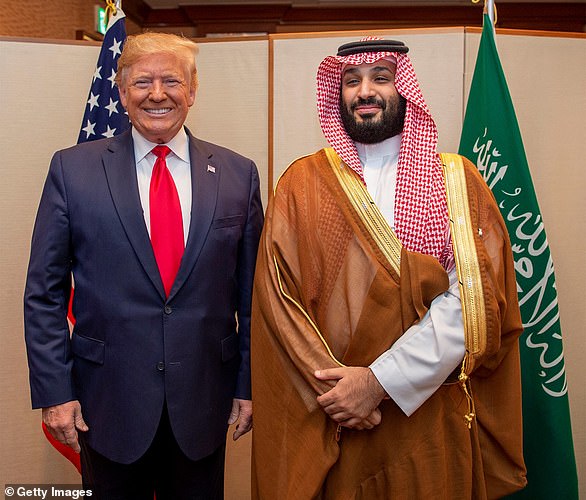

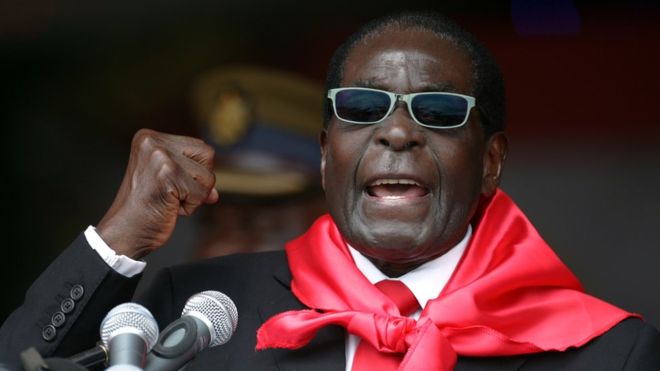
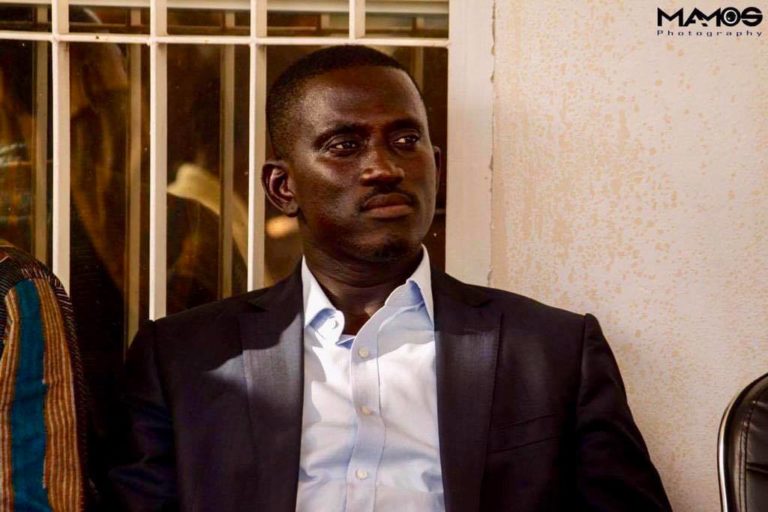
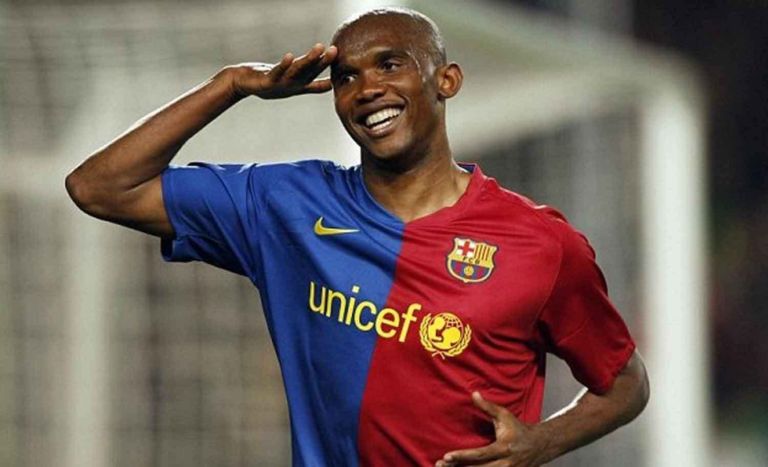

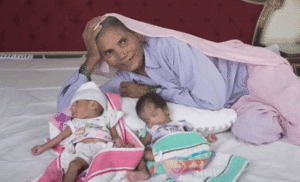 70-year-old Indian woman who gave birth to twins in 2015
70-year-old Indian woman who gave birth to twins in 2015